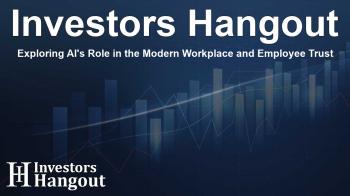Exploring AI's Role in the Modern Workplace and Employee Trust

Understanding Employee Trust in AI
CalypsoAI, a leader in AI security solutions, has recently unveiled its latest research, revealing significant insights into employee perspectives on artificial intelligence (AI) within the workplace. The findings from the Insider AI Threat Report indicate that a surprising 52% of U.S. employees are open to using AI to streamline their work, even if this means breaking established company policies.
Shifting Perceptions Among Workers
This report sheds light on the evolving relationship between employees and technology. Alarmingly, 45% of workers reported a greater trust in AI systems compared to their colleagues. Moreover, a substantial portion, 34%, expressed readiness to resign if their employer prohibited the use of AI tools.
Early Career Professionals' Insights
Entry-level employees appear particularly vulnerable in this landscape. Approximately 37% of new professionals admitted they wouldn't feel remorseful about violating AI-related policies, primarily due to a perception that existing regulations are ambiguous. In fact, 21% of them state that unclear rules lead them to simply choose what works best for their tasks.
Implications Across Different Industries
Different sectors exhibit varied levels of compliance and understanding regarding AI policies. For instance, the finance and healthcare industries particularly reveal a concerning trend. In the finance sector, 60% of individuals acknowledged having violated AI policies, with one-third admitting to utilizing AI to access restricted data. Similarly, in the healthcare realm, only 55% of workers were aware of and adhered to their organization's AI regulations.
Concerns Within the Security Sector
Employees in the security industry also displayed troubling tendencies, with 42% using AI tools in direct conflict with company policies. Notably, 58% of these individuals reported a higher level of trust in AI than in their human counterparts. This pattern raises legitimate concerns regarding the potential risks associated with unregulated AI use, especially in critical sectors like security and healthcare.
Understanding the C-Suite Perspective
The CEOs and executives at the top levels of organizations are not immune to these shifts either. A substantial 50% indicated they would prefer interacting with AI managers over human ones. However, a significant 34% were uncertain whether they could distinguish between AI personnel and actual human employees. These findings underscore the need for educational initiatives to clarify the role and nature of AI within companies.
Concluding Insights on AI Usage
Donnchadh Casey, the CEO of CalypsoAI, emphasized the urgency of understanding the implications of AI technology within organizations. According to Casey, executives are rapidly adopting AI without fully grasping the risks associated, particularly as frontline employees continue to utilize AI without adequate supervision. This misuse can lead to potentially disastrous consequences for businesses today and in the future.
CalypsoAI's Insider AI Threat Report drives home the message that businesses must broaden their understanding of AI security to encompass not only technological aspects but also the human behaviors that influence trust and compliance in the workplace. If organizations want to safeguard their operations and assets effectively, they must consider how employees interact with AI and establish clear guidelines that align with technological advancements.
Frequently Asked Questions
1. What does the Insider AI Threat Report reveal?
The report highlights how AI is affecting employee trust and behavior, with many using it despite existing company policies.
2. Which group of employees shows the highest willingness to violate AI policies?
Entry-level employees are the most willing, with many saying they feel no guilt about breaking such rules.
3. Are executives also adjusting to AI in the workplace?
Yes, a significant number of executives prefer AI interaction over human managers, raising concerns about understanding AI.
4. What risks do different industries face regarding AI usage?
Healthcare, finance, and security sectors show notable violations of AI policies, increasing their liability and compliance risks.
5. How should companies address AI security?
Companies should extend their security policies to include understanding employee interactions with AI tools and establish clear usage guidelines.
About The Author
Contact Lucas Young privately here. Or send an email with ATTN: Lucas Young as the subject to contact@investorshangout.com.
About Investors Hangout
Investors Hangout is a leading online stock forum for financial discussion and learning, offering a wide range of free tools and resources. It draws in traders of all levels, who exchange market knowledge, investigate trading tactics, and keep an eye on industry developments in real time. Featuring financial articles, stock message boards, quotes, charts, company profiles, and live news updates. Through cooperative learning and a wealth of informational resources, it helps users from novices creating their first portfolios to experts honing their techniques. Join Investors Hangout today: https://investorshangout.com/
The content of this article is based on factual, publicly available information and does not represent legal, financial, or investment advice. Investors Hangout does not offer financial advice, and the author is not a licensed financial advisor. Consult a qualified advisor before making any financial or investment decisions based on this article. This article should not be considered advice to purchase, sell, or hold any securities or other investments. If any of the material provided here is inaccurate, please contact us for corrections.

